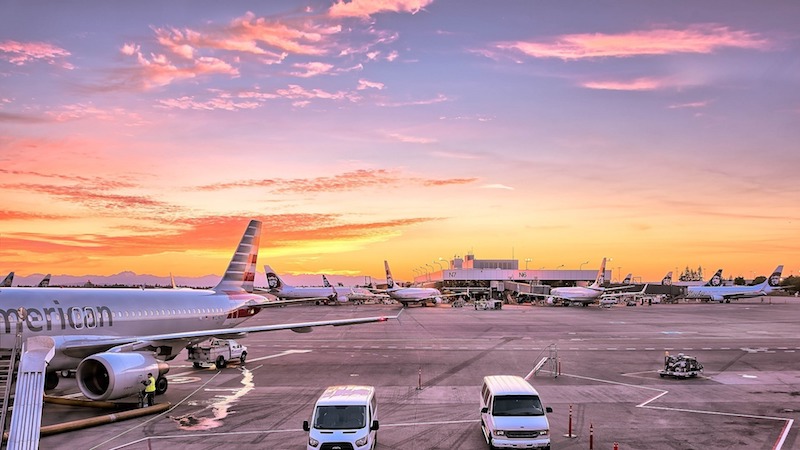Over the last five years, airlines have changed the requirements for reaching elite status from a certain number of miles flown to that component plus revenue from tickets. The airlines have all made clear that they want to reward high spenders and have convinced themselves (though perhaps not the general public) that this will benefit many travelers. However, if revenue is the goal, why are they still subjecting high spenders to miles or segments flown?
If you are considering booking travel or signing up for a new credit card please click here. Both support LiveAndLetsFly.com.
If you haven’t followed us on Facebook or Instagram, add us today.
If Revenue Is All That Matters, Why Are Miles/Segments/Nights Important?
If airlines and hotels are chasing high-value clients and courting them over high-frequency travelers then why is there a mileage component at all? I have a colleague whose role at work recently changed. He went from locally managing a regional business unit to covering business units spanning from New York to Utah. His airfare isn’t necessarily long distance, he isn’t running to China every week, but expensive last-minute coach tickets into smaller markets add up. He qualified for Gold Status on American from a spend perspective before January was over ($3000). Over the course of the year, he will exceed Executive Platinum’s $12,000 and maybe (if he concentrates) the same for United’s 1K status. His flights are relatively short, through January he had amassed just 4,000 miles on American. At his current rate, he will have spent enough on domestic travel to qualify for Executive Platinum status with only 60% of the miles he needs for Gold.
Why does American Airlines care how many miles he flies? The thought that another colleague who happens to fly more miles on cheaper tickets will get complimentary upgrades for half the spend while he sits in the back of the plane is so counterintuitive to their goals it makes my head hurt.

I can understand that perhaps the carriers want to avoid giving away all of their benefits to a flyer who isn’t really frequent but spent the required money one time on a last minute business trip. I can understand the desire to balance an infrequent flyer who happened to buy an expensive ticket one time, with carefully rewarding the truly loyal who fly your airline every week on cheaper fares. Gary Leff always says that he is not his fare, and I agree with that most of the time. However, in this case, why would American want to reward a 25,000 mile/30 segment flyer that scraped by at $3000 over my colleague spending 12x that amount and flying 90% less? He’s an easy customer to please, upgrade him and he will continue to pour money into your bottom line.
The same applies to hotels in a different capacity. Lucky pointed out that lifetime Platinum status at SPG hotels comes after 1,000 nights and ten years of qualifying for Platinum status. If you have spent three years of your life in SPG properties, whether that happened in three straight years or over more than 10, why would it matter to SPG? Are you less valuable to the brand if the 1,000 nights came in consecutive years rather than over a decade?
Last year with IHG I amassed 120 nights and 280,000 points. Top-tier Spire status requires 75 nights or 75,000 points and they are willing to rollover dozens of nights (though it may take months to post) regardless of how much was spent, why not roll over the points (which are derived from spend)? If I had earned 300,000 points but stayed just 75 nights in their property why am I rewarded less than someone who stayed more nights at cheaper rates? Wouldn’t I have earned more credit than another guest who stayed 100 nights but just barely scraped together 75,000 points? In the case of IHG it doesn’t really matter anyway because they don’t treat elites very well as it is.
It’s Not Always Bad To Switch to Revenue
Switching to revenue requirements for airlines was likely a net positive event for business travelers. Short lead times on trips (as opposed to leisure travelers that book well in advance) typically drives up the cost of flights and hotel stays. For them, the revenue component is easier to achieve and now they are rewarded for their travel spend not their travel distance. Additionally, with fewer leisure flyers qualifying for status due to the revenue requirements, business travelers would stand a better chance at scoring an upgrade (if the airlines had maintained the same first class seat quantity). In theory, those travelers now earn more miles than they did before and have a better chance to secure a seat in the front due to less qualified elite flyers.

In the case of Starbucks – yes, the coffee company – their system awarded stars solely based on completed transactions. If you grabbed four coffees for your co-workers on one receipt, you earned one star. A $20 order earned the same amount of stars as someone who purchased $1 worth of mints at the register. That seems inequitable to me and apparently, it did to the Starbucks team as well. In 2016 the brand switched to a revenue-based point system and while some guests clearly didn’t like the change (revenue dropped below 5% for the first time in 25 straight quarters – attributed to the change) I personally thought it made more sense for my buying patterns.
Revenue Is Either Important or It’s Not
I can understand why airlines switched from miles and segments as sole qualifiers to requiring revenue in exchange for the benefits received. While I was certainly one of those flyers who achieved 100,000+ miles on cheap tickets to Asia and earned Executive Platinum status for less than $4000 – twice – I can appreciate that the airlines wanted to make a change.
Now we are seeing the flip side of the coin because travelers pay closer attention to their fares. My colleague has a tough time understanding how his $20,000/year in airline travel spend will have nearly doubled Executive Platinum and 1K status requirements, and yet he can’t clear an upgrade because he doesn’t fly far enough. If revenue really is the key qualifier, it shouldn’t matter if he spent that on one flight or 100. We also know that revenue is the key component as with all three of the major US carriers, it’s the only element of the three that qualify a traveler for status, that’s non-negotiable. At United and Delta there are no waivers to avoid spending that amount on those airlines and holding the status.
As Gary Leff has often pointed out: you are not your fare. For example: You live in New York and travel to Florida frequently where your chosen airline happens to offer competitive fares. If you book the same airline every time, you shouldn’t be penalized simply because the airline doesn’t charge more for the route. A passenger that flies 100,000 miles with any carrier should earn status whether they spent $12,000/year or not in the same way that someone who spent the required dollar amount shouldn’t have to mileage run to get the perks.

My Proposed Solution
Airlines should offer waivers to allow passengers who meet alternative requirements. If a passenger spends $15,000 they should receive the top benefits regardless of the miles flown. If a passenger likewise flies 125,000 miles it shouldn’t matter how much they spent. Both travelers are demonstrating extreme loyalty to the carriers, it’s time the carriers did the same.
What do you think? Should high-spending travelers have to complete the mileage/segment portions of the requirements? What about highly frequent flyers traveling on low-priced routes?




>Revenue Is Either Important or It’s Not
Not quite.
Revenue is always important. But it’s not always the most important thing.
Fundamentally, somebody who flies 100K miles for $35K revenue is more important to the airline than someone who flies 100K miles for $3.5K revenue, and the carriers are trying to balance that.
IMHO, the far bigger problem is not on the status earning side, but the status *using* side. My 1K benefits are only marginally better than my Platinum benefits, despite the extra 25K miles and $12K revenue.
Isn’t life time plt only 500 nights not 1000?
They are leaving money on the table if they let you qualify on spend alone in one or two trips. It’s really not a loyalty program then either just a rebate based on spend. I don’t think the passenger who makes 1 or 2 trips at high margin is valuable enough to just give status to given their travel patterns. Their are more passengers who fall into those categories and they tend to fly high volume routes, where the ticket prices are high. I’m thinking about the replacement cost of the customer, which depends on the routes and frequency they fly.
Respectfully, I disagree. My colleague only cares about status when it benefits him. The airlines aren’t leaving money on the table by keeping the miles requirement because he’s not going to mileage run to get there for status. If he gets the benefits from status on a flight, it will encourage him to focus his flying with them even more, but he’s not going to chase them before he sees any personal benefit.
I fly NYC to TPA/MCO almost every week. Due to several things, my flights are always last minute and cost 3-400 each way (vs the typical 90-120 if you buy ahead of time).
I’ve spent over 8k this year on flights but have no status at all. I’m going to keep spending the high fares but delta doesn’t get my guaranteed business because I still haven’t qualified for their status because of miles. I’ve flown 5-6 times on other airlines, losing delta $3-$4k in revenue already. Any airline that offered me a simple status so I don’t need to worry about sitting in a middle seat not being able to work, would get my business 100% of the time they were available.
Perfect example. Why stay with Delta for those flights if they give you nothing for it? Wouldn’t they rather keep your $8k by simply giving you entry level status rather than watch you switch to someone else who offers the route? Southwest would give you something for that, maybe it’s time for a switch.
I think maybe an alternate parallel qualification schedule, like the EQD amounts are bumped up 50%, but a significantly lowered EQM/EQS requirement.
That makes sense to me.
There’s already a program for high spenders who don’t fly the necessary miles – it’s called Global Services. Spend $40K plus and your miles flown become somewhat irrelevant. It just so happens that is the spend level vs. $20K.
AA CK may not be there yet but they likely will be.
Sure, but don’t you think my colleague who spends $20k deserves more than a gold flyer who barely slides in at 25,000 miles and $3,000 or worse, has a credit card EQD waiver?
I was glad to see this topic covered here because I have also long wondered why the mileage component was required. I have also wondered what would be the downside to granting status to a customer that qualified with only one expensive trip in J – it would seem to me that having status might encourage that customer to fly the airline again on their next trip, which might also be an expensive trip in J.
But apparently the airlines research shows that granting status based on this single expensive trip won’t generate enough revenue to offset the cost of granting status.
I like Delta’s approach with the rollover MQMs. I’m Platinum so I need 75K MQMs annually to re-qualify. Last year I flew about 120K miles, so the extra 45K miles from last year rolled over to this year. As of today, I’m less than 20K MQMs from my 2019 status but likely won’t meet the spend requirements until November or December.
I wouldn’t put much stock into airline research, they don’t seem to pay much attention to obviously horrible business decisions. Rollover works too, but it should be rollover for excess spend as well as far as I am concerned.
i have the same issues. Last year on AA my spend was a bit over 5K but only 18 segments and 24.6K miles. So despite the spend qualified for nothing.
My solution? Transfer status to Alaska and I didn’t bother to try to drum up the extra 400 miles on AA.
Problem solved.
So you’re saying it didn’t incentivize you to fly more with the carrier, I agree that it wouldn’t have a positive correlation with the colleague I mentioned.
I actually am a high volume, price savvy flier. I usually fly around 75k miles per year, but only have DL GM status with about 6001 spend per year because I find those fares are good discounts and am flexible with my plans (e.g. recently I flew into FRA when LUX would have been better but three times the price). I think it would make sense to reward savvy and intelligent fliers as much as you reward fliers who pay their way. Both ways are signs of true value for the airline.
Yeah, I think it depends on whether you want to reward loyalty or spend. I was under the impression it was revenue as of late but I could be wrong.
You had mentioned your friend could probably hit the spend for 1k and exp.
This is why they have the mileage thresholds. They want to capture incremental business. If someone spends on big $ tickets…they want them to need to concentrate their spend, rather than spread it out and be elite everywhere.
I guess, but then again, they also don’t give him a reason to choose that airline instead of another. If he had the slightest preferential benefit he probably wouldn’t split between the two carriers, but that’s not really been his experience.
IMO this is the best explanation I’ve seen so far.